Goodbye for nowpublished at 19:12 BST 15 June 2020
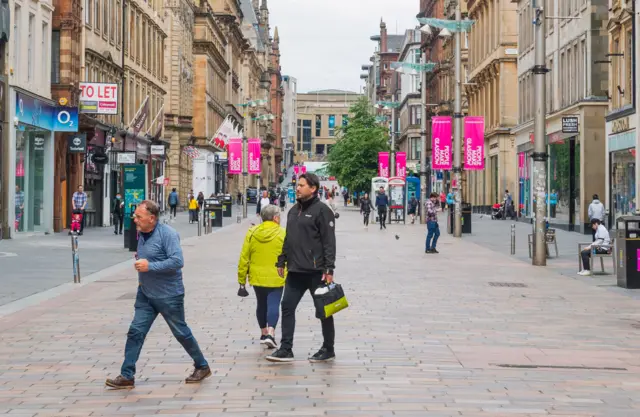 Image source, SNS
Image source, SNSThat ends our coverage of today's events in the Covid-19 pandemic in Scotland.
Join us again in the morning for the latest up-to-date developments. In the meantime, stay safe.
Council planning for the new academic year will "maximise the time young people spend in a school environment", says Nicola Sturgeon
At her Monday briefing she pledges that schooling will be returned to normal "as quickly" as possible
There are no plans for blended learning to last a year - "or anything like it", says the FM
Ms Sturgeon hopes to confirm later this week that Scotland is ready to move into phase two of lockdown easing measures
The first minister warns not all elements of phase two will kick in straight away, but she should be able to provide a date for retailers to reopen
There were no new registered deaths over the last 24 hours
2,448 deaths have now been recorded in Scotland of people who have tested positive for Covid-19
Richard Leonard urges an independent body to investigate whether the human rights of care home residents have been violated during the Covid-19 crisis
BBC Scotland News
 Image source, SNS
Image source, SNSThat ends our coverage of today's events in the Covid-19 pandemic in Scotland.
Join us again in the morning for the latest up-to-date developments. In the meantime, stay safe.
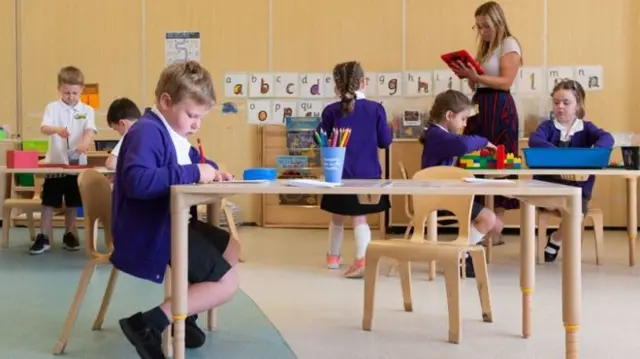 Image source, PA
Image source, PASome of the developments in Scotland's coronavirus response on Monday:
Allow X content?
This article contains content provided by X. We ask for your permission before anything is loaded, as they may be using cookies and other technologies. You may want to read X’s cookie policy, external and privacy policy, external before accepting. To view this content choose ‘accept and continue’.
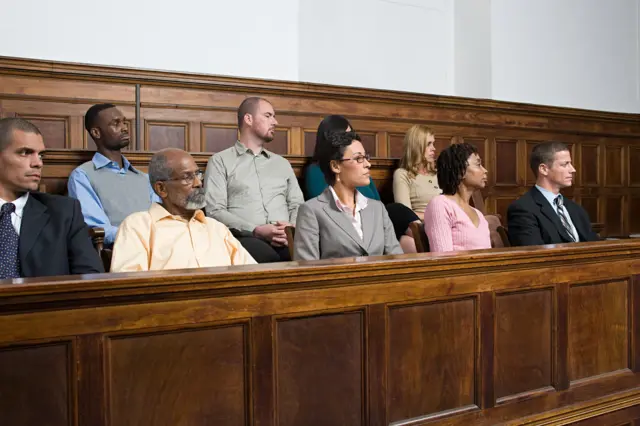 Image source, getty
Image source, gettyThe first jury citations have been issued since the start of lockdown ahead of the return of high court trials next month.
Notices will drop through letterboxes from Monday for potential jurors with court trials due to restart in Glasgow and Edinburgh from July.
A raft of anti-virus measures have been introduced to protect accused, jurors, witnesses, lawyers, staff and judiciary.
Lord justice clerk Lady Dorrian said: "The courts have been working extremely hard to deliver justice in the current coronavirus circumstances.
"I am satisfied that this work will enable jury trials to take place in a way that ensures the safety and confidence of jurors and all parties, and builds trust in our ability to operate within the strict guidelines set out by Public Health Scotland."
Trials will continue to be conducted with 15 jurors under the same legal standards and procedures as before. No new criminal jury trials have gone ahead since mid-March.
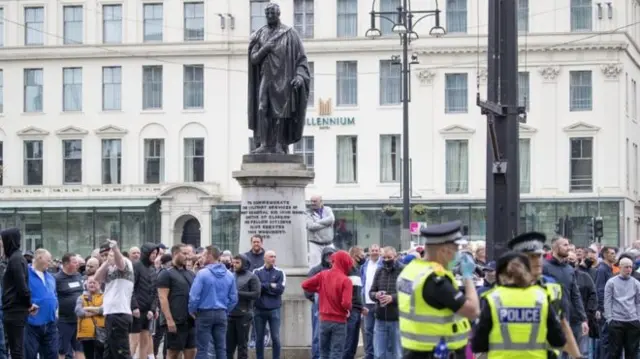 Image source, PA Media
Image source, PA MediaThe Robert Peel statue in Glasgow has become a potential flashpoint between demonstrators
Recent protests are "self-indulgent" and "unnecessary," the chairman of the Scottish Police Federation says.
David Hamilton told Drivetime officers were putting themselves at risk in the middle of a pandemic in order to respond to these assemblies.
Police in Glasgow averted a clash between protesters over a statue at the weekend.
Hundreds of people descended on George Square to call for the statue of Met Police founder Robert Peel to stay - after other activists called for its removal.
Mr Hamilton said abuse directed towards officers trying to do their job was "absolutely unacceptable".
Quote MessagePeople should not be out protesting physically likely this. It is frankly self-indulgent for people who have got other means of protesting and making their point to physically come together, putting other people at risk, themselves at risk, and police officers and everybody else at risk because they want to make a point that could be made in another way.
David Hamilton, Chair of the Scottish Police Federation
 Drivetime with John Beattie
Drivetime with John Beattie
BBC Radio Scotland
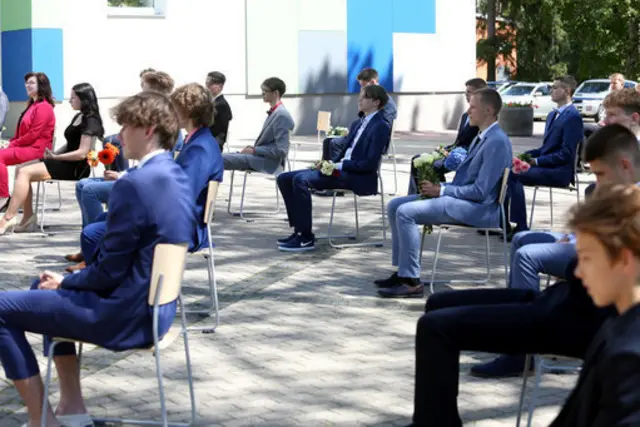 Image source, PA Media
Image source, PA MediaThe Scottish government has been challenged to come up with more money if it wants pupils to be offered more in-school teaching than is being offered by councils planning for a return to class in August.
First Minister Nicola Sturgeon suggested earlier that she was not happy with the mix of blended learning being proposed by some local authorities.
But Allison Evison, president of local authority parent body Cosla, told Lucy Whyte on Drivetime: "If you look at the funding needed by local councils in a period from March to June, we are already needing £45m additional money on top of what has already been given by the Scottish government.
"Local councils have all made the best possible plans in terms of the resources they have at the moment - in terms of buildings they have, teaching staff and support staff.
"If the Scottish government is not happy, we need a realistic conversation about where that money is coming from. Councils have been under-resourced for a long time and there's no spare cash sitting around anywhere."
Ms Evison adds that, if schools are to accommodate more children while maintaining safety and social distancing rules, it would require the use of other buildings and employing more teachers and more support staff - all of which costs more money.
 Drivetime with John Beattie
Drivetime with John Beattie
BBC Radio Scotland
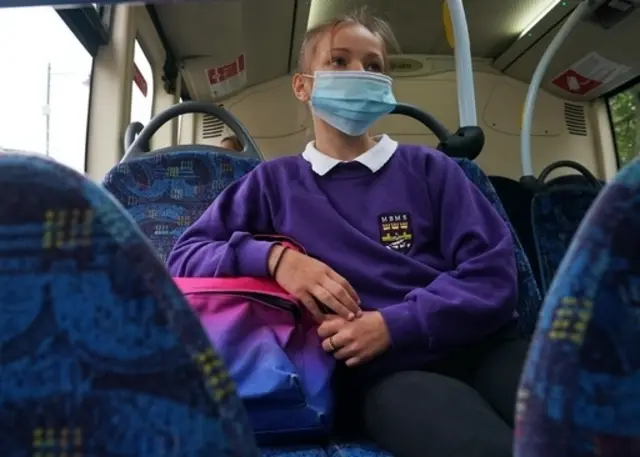 Image source, PA Media
Image source, PA MediaA group of parents have started a campaign to encourage the Scottish government to introduce a national standard for blended learning amid fears of major differences at schools around the country.
Mother of two and public affairs professional Sarah Chisnall told BBC Radio Scotland that the 50-50 group emerged over the weekend following "a lot of anger from parents and carers" on Twitter.
Ms Chisnall learned on Friday that her teenage son faced having just one day per week of in-school teaching provided by City of Edinburgh Council in August.
First Minister Nicola Sturgeon has indicated that such rates were not acceptable.
Ms Chisnall has told the BBC's Lucy Whyte her group wants the Scottish government "to look at a standard guaranteed national minimum of 50% school time for children and a national standardised best practice for online learning for the other 50%".
Ms Chisnall said there were big difference in what councils were offering. While her son has "had very little interactive learning" across the council border in Midlothian "there is much more availability", she said.
Five things you need to know about the coronavirus outbreak this evening.
Read More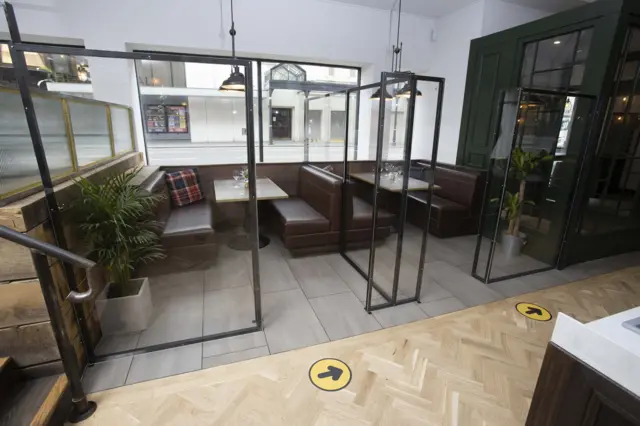 Image source, PA Media
Image source, PA MediaA Glasgow bar has created separated dining pods in a bid to comply with social distancing measures once allowed to open.
Pubs, hotels and restaurants have been told to prepare to reopen on 15 July.
Perspex screens divide 21 private dining and drinking spaces at the Ardnamurchan in Hope Street. A third of the bar's seating has been removed.
Licensee Neil Douglas hopes the measures will meet health and safety consultant approval.
Mr Douglas said: "Our aim is to keep all the character and ambience of the venues and maintain a great experience for customers while providing the safety measures that many will want."
 Drivetime with John Beattie
Drivetime with John Beattie
BBC Radio Scotland
The chief executive of NHS Greater Glasgow and Clyde said the health board is sorry for distress and anxiety caused to patients families and staff at the QEUH.
A report has said there were a "series of problems" with the design and build of the Glasgow hospital campus - but no clear evidence to link those failures to any "avoidable deaths".
The Queen Elizabeth University Hospital opened in 2015, but fears were raised after deaths were linked to infections.
An independent review concluded that some patients had been "exposed to risk that could have been lower", external.
NHS GGC chief executiveJane Grant insisted the board was working hard to address the issues raised in the 227-page independent report.
She said there was an issue within a section of the infection control team but work was ongoing with the team and Scottish government to create a "supportive and inclusive culture" going forward.
Today's Scottish government coronavirus daily briefing was dominated by the return of schools.
Nicola Sturgeon expects councils to have plans in place by 11 August to “maximise” face-to-face learning.
The Scottish government will intervene to ask councils to revise their plans where maximising time in schools is not happening.
Here are the other key points from today's briefing:
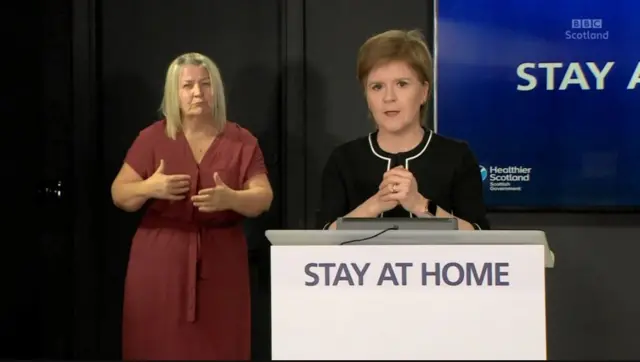
 Drivetime with John Beattie
Drivetime with John Beattie
BBC Radio Scotland
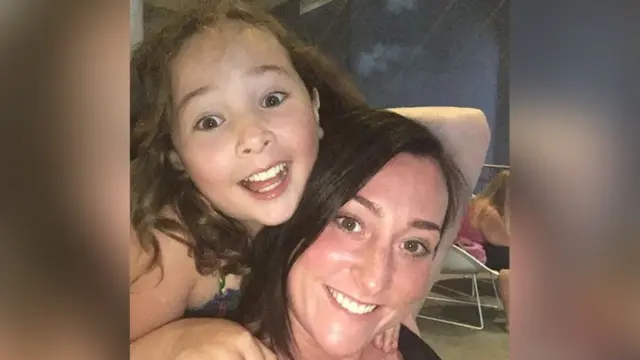 Image source, KIMBERLY DARROCH
Image source, KIMBERLY DARROCHMilly Main died after contracting an infection at the Royal Hospital for Children
Health Secretary Jeane Freeman has apologised to patients and families who say they were affected by microbiological contaminants at the Queen Elizabeth University Hospital complex in Glasgow.
She spoke following the publication of a report which said there were a "series of problems" with the design of the hospital.
10-year-old Milly Main died at the Royal Hospital for Children in 2017 while recovering from leukaemia. Her family believe her death was caused by an infection picked up at the hospital.
Her mum, Kimberly Darroch, said she was "disappointed" the report had not answered questions she had about Milly's death.
She said: "We're jumping through hoops to get answers from the health board. At every turn they're denying to cover up all the failings that they've made as a health board."
She is hopeful a fatal accident inquiry will be established because she has no trust in the health board.
"They've completely let Milly down," she added.
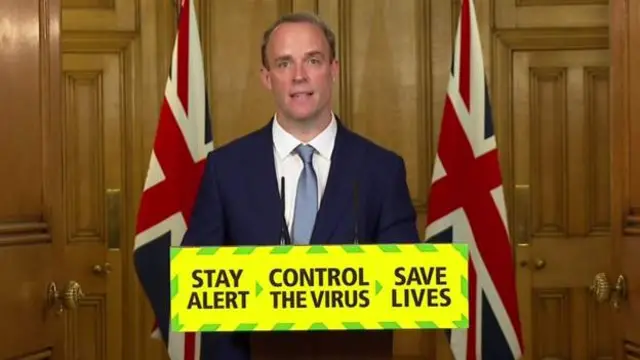 Image source, bbc
Image source, bbcForeign Secretary Dominic Raab leads tonight's UK coronavirus briefing
The foreign secretary says that experience of the coronavirus in other countries shows there is a risk of a second spike in infections - proving the need for a cautious approach.
He describes the reopening of shops in England as "very much a managed process".
Non-essential shops remain closed in Scotland, although we expect an announcement on the further easing of lockdown restrictions from the first minister on Thursday.
 Drivetime with John Beattie
Drivetime with John Beattie
BBC Radio Scotland
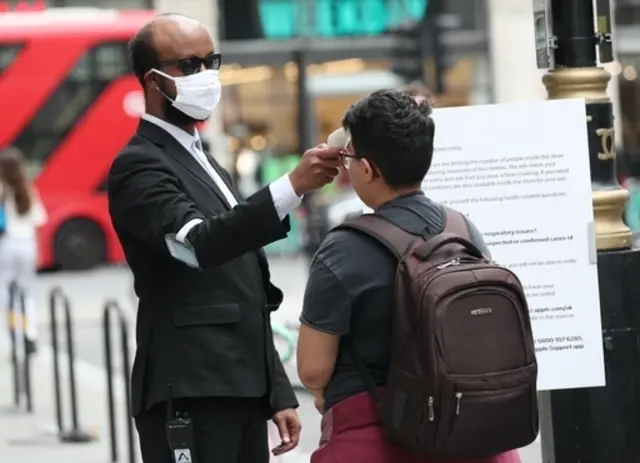 Image source, PA Media
Image source, PA MediaCustomers are having their temperature checked on entering the Apple store in London
"It was pretty strange," a London-based Scottish journalist tells BBC Radio Scotland after experiencing the first day of England's non-essential shops being able to open following lockdown.
Ahead of opening this morning, there were long queues outside a number of shops and Lewis McKenzie tells Lucy Whyte: "The number of people being allowed into shops at any one time has been limited.
"There is also a queuing system, much like we have been queuing to get into supermarkets the past few months, where it is socially distanced and you have to wait your turn to go in.
"In pretty much every shop I went into today, there was hand sanitiser available when you were entering and leaving that you could use."
Mr McKenzie reveals that book shop Waterston's has recognised the need for browsing and supplies trolleys where customers can place books they have touched but not bought so they can be quarantined before a return to the shelves.
Allow X content?
This article contains content provided by X. We ask for your permission before anything is loaded, as they may be using cookies and other technologies. You may want to read X’s cookie policy, external and privacy policy, external before accepting. To view this content choose ‘accept and continue’.
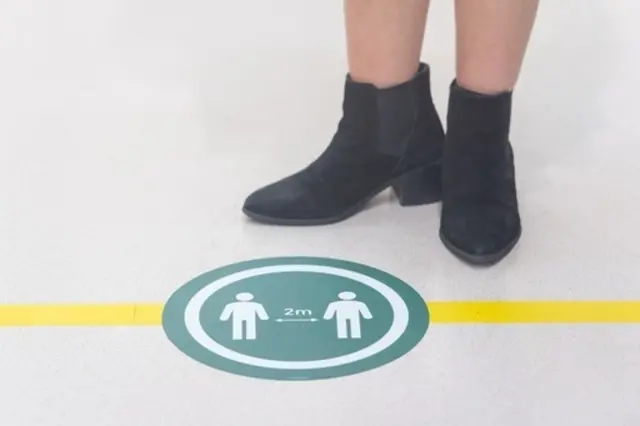 Image source, PA Media
Image source, PA MediaUK minister of state for health, Edward Argar, has told the Commons that it would be "premature" to speculate on the conclusion of a review into the 2m social distancing rule.
He said the review was being led by scientific evidence and would consider the effect on businesses, particularly the hospitality sector.
Backbench Conservative MP Greg Clark, who secured this parliamentary urgent question, asked why the UK had chosen a larger distance than many other countries, while other countries have mandated face coverings.
Argar said the scientific evidence suggested an increased risk of transmission of the virus at shorter distances, and pointed out that other countries, including Spain, also have a 2m rule.
A series of SNP MPs said the 2m rule should be kept for as long as necessary to protect health
First Minister Nicola Sturgeon has said that the two-metre rule is also under review in Scotland but indicated today she was not yet minded to reduce the social distancing rule.
Argar said the review would issue a report in the coming weeks, but declined to set a date.
Allow X content?
This article contains content provided by X. We ask for your permission before anything is loaded, as they may be using cookies and other technologies. You may want to read X’s cookie policy, external and privacy policy, external before accepting. To view this content choose ‘accept and continue’.
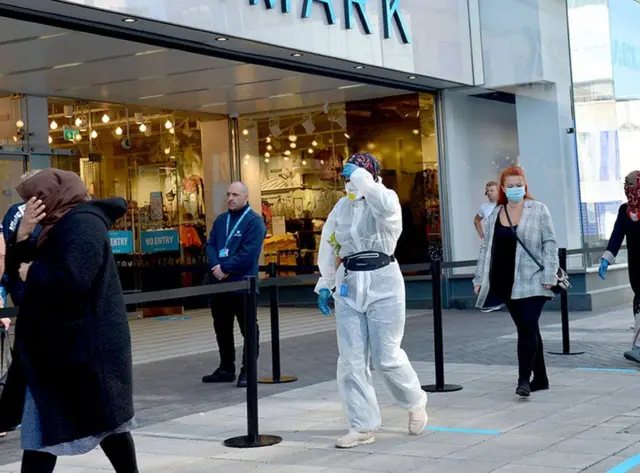 Image source, PA Media
Image source, PA MediaSome shoppers in England took protective precautions to stop the spread of Covid-19
A poll has suggested that less than half of Britons feel comfortable returning to clothes retailers.
Results of YouGov polling carried out earlier this month suggested just 40% of people were comfortable to go back into such stores and only 48% think they would be able to stay the required two metres away from other shoppers.
Non-essential retail shops have been able to open in England today, subject to social distancing measures.
Forty-one per cent of people said they believe it is the right time for the shops to reopen but 39% said it was too soon.
The UK government's daily press conference is due in about 40 minutes.
It's being held by Foreign Secretary Dominic Raab.
As far as we know, he will not be joined by any of the government's scientific advisers.
The Scottish government is "delusional" about plans for pupils to return to schools and sit exams as normal next year, according to the Scottish Greens.
At her daily briefing, the first minister said it was the Scottish government's "firm intention" that next year's exams would go ahead - and that there were no plans for blended learning to last a year.
Scotland's schools are due to re-open from 11 August, but will initially have a "blended" approach involving face-to-face teaching and at-home learning.
Quote MessageForcing pupils to sit exams as normal at the end of a completely abnormal disrupted year is a recipe for disaster. To say exams can go ahead as normal under these circumstances is delusional."
Ross Greer, Scottish Green education spokesperson